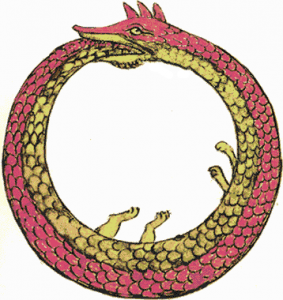René Descartes’s “first principle” of philosophy states:
Cogito, ergo sum
je pense, donc je suis (Fr.)
I think, therefore I am (Eng.)
Expounded by Descartes himself as:
Dubito, ergo sum, vel, quod idem est, cogito, ergo sum
I doubt, therefore I am — or what is the same — I think, therefore I am.
Herein Posited:
Wherein, without objects of cognition, there can be no cognition.
Herein, “I” cognizes mind and infers a self.
Therein, mind cognizes mind, cognate, “I” is self cognizant.
Aggregate, ergo non sum
Summation, therefore I am not
Basis of posit:
Shantideva reflects in his text, “The Boddhisattva Way“:
57. The teeth, the hair, the nails are not the “I,”
And “I” is not the bones or blood;
The mucus from the nose, and phlegm, are not the “I,”
And neither is it made of lymph or pus.
58. The “I” is not the body’s grease or sweat,
The lungs and liver likewise do not constitute it.
Neither are the inner organs “I,”
Nor yet the body’s excrement and waste.
59. The flesh and skin are not the “I,”
And neither are the body’s warmth and breath.
The cavities within the frame are not the “I,”
And “I” is not accounted for within the six perceptions.
73. The thoughts now passed, and those to come, are not the self;
They are no more, or are not yet.
Is then the self the thought which now is born?
If so, it sinks to nothing when the latter fades.
“74c. Analytical investigation will find no “I,” no underlying self.”
H.H. The Dalai Lama’s meditative commentary in “Practicing Wisdom” elaborates:
“It is quite evident that if we search for the “self,” it is unfindable. However, the implication of this is not that the self does not exist, for we know from our personal experience that we undergo pain and pleasure. We know that it is something or someone who has these experiences. However, if we search for it, it is unfindable. The conclusion we arrive at, therefore, is that the self can only be said to exist nominally, by the power of conceptual designation.
With this thought in the background, try and examine how things, including your own self, appear to your mind. Do they appear as if they possess only nominal status, or do they appear to you in a different light? Certainly they do not appear as being only nominally real; they appear to possess some kind of objective, intrinsic existence-to exist in their own right. They do not appear to exist by the power of designation; they appear to enjoy an objective, independent status.
What we arrive at, then, as a result of our reflection, is a deep conviction that things do not exist in the manner in which they appear.
While resting in meditative equipoise on emptiness, you should not have even lingering feelings that “This is emptiness” or “I am meditating on emptiness.” You should instead try to remain absorbed single-pointedly in the mere absence of intrinsic existence-the unfindability of phenomena when searched for through critical enquiry. It should be as if your mind has become fused with emptiness. You should not have any sense of a subject-and-object duality, as if you are observing something “out there.” Like this, meditate on emptiness.”
“We can eliminate ignorance because we can develop its opposing state of mind, the insight into emptiness. This insight directly opposes the way our mind grasps onto a nonexistent self. Since, in reality, there is no such self, the insight that penetrates into the nature of reality perceives its absence. Thus, meditation on emptiness is firmly based on reason and can therefore eliminate the ignorant mind that grasps onto the intrinsic existence of the self.”
“The root cause of suffering is the misperceiving mind grasping at intrinsic existence, a distorted mind that has the potential to be eliminated. This can be achieved by generating a deep insight into the nature of emptiness. Reflect upon these potentials. We should then develop a deep compassion for all beings and try to enhance that capacity within.”


3 Replies to “Ergo Non Sum ”